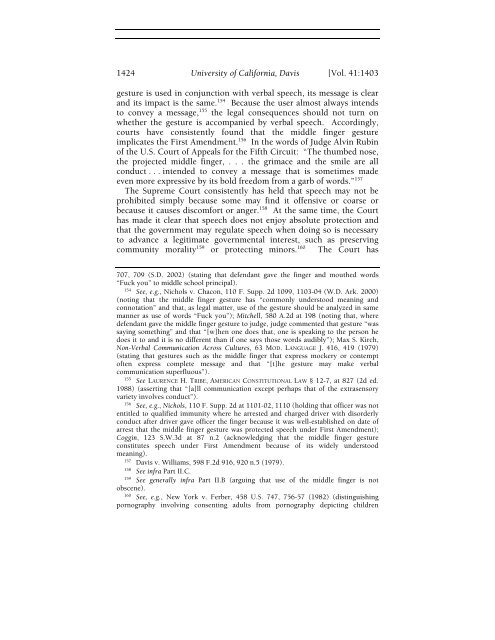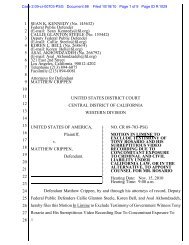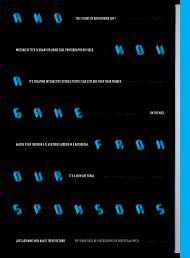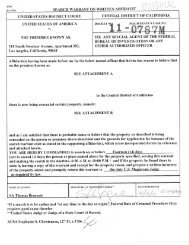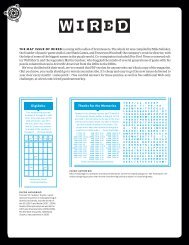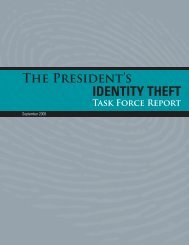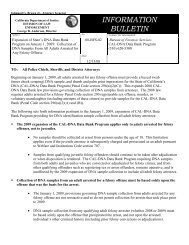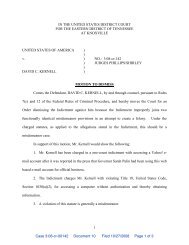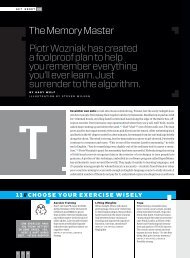Digitus Impudicus: The Middle Finger and the Law - Wired
Digitus Impudicus: The Middle Finger and the Law - Wired
Digitus Impudicus: The Middle Finger and the Law - Wired
Create successful ePaper yourself
Turn your PDF publications into a flip-book with our unique Google optimized e-Paper software.
1424 University of California, Davis [Vol. 41:1403<br />
gesture is used in conjunction with verbal speech, its message is clear<br />
<strong>and</strong> its impact is <strong>the</strong> same. 154 Because <strong>the</strong> user almost always intends<br />
to convey a message, 155 <strong>the</strong> legal consequences should not turn on<br />
whe<strong>the</strong>r <strong>the</strong> gesture is accompanied by verbal speech. Accordingly,<br />
courts have consistently found that <strong>the</strong> middle finger gesture<br />
implicates <strong>the</strong> First Amendment. 156 In <strong>the</strong> words of Judge Alvin Rubin<br />
of <strong>the</strong> U.S. Court of Appeals for <strong>the</strong> Fifth Circuit: “<strong>The</strong> thumbed nose,<br />
<strong>the</strong> projected middle finger, . . . <strong>the</strong> grimace <strong>and</strong> <strong>the</strong> smile are all<br />
conduct . . . intended to convey a message that is sometimes made<br />
even more expressive by its bold freedom from a garb of words.” 157<br />
<strong>The</strong> Supreme Court consistently has held that speech may not be<br />
prohibited simply because some may find it offensive or coarse or<br />
because it causes discomfort or anger. 158 At <strong>the</strong> same time, <strong>the</strong> Court<br />
has made it clear that speech does not enjoy absolute protection <strong>and</strong><br />
that <strong>the</strong> government may regulate speech when doing so is necessary<br />
to advance a legitimate governmental interest, such as preserving<br />
community morality 159 or protecting minors. 160 <strong>The</strong> Court has<br />
707, 709 (S.D. 2002) (stating that defendant gave <strong>the</strong> finger <strong>and</strong> mou<strong>the</strong>d words<br />
“Fuck you” to middle school principal).<br />
154 See, e.g., Nichols v. Chacon, 110 F. Supp. 2d 1099, 1103-04 (W.D. Ark. 2000)<br />
(noting that <strong>the</strong> middle finger gesture has “commonly understood meaning <strong>and</strong><br />
connotation” <strong>and</strong> that, as legal matter, use of <strong>the</strong> gesture should be analyzed in same<br />
manner as use of words “Fuck you”); Mitchell, 580 A.2d at 198 (noting that, where<br />
defendant gave <strong>the</strong> middle finger gesture to judge, judge commented that gesture “was<br />
saying something” <strong>and</strong> that “[w]hen one does that, one is speaking to <strong>the</strong> person he<br />
does it to <strong>and</strong> it is no different than if one says those words audibly”); Max S. Kirch,<br />
Non-Verbal Communication Across Cultures, 63 MOD. LANGUAGE J. 416, 419 (1979)<br />
(stating that gestures such as <strong>the</strong> middle finger that express mockery or contempt<br />
often express complete message <strong>and</strong> that “[t]he gesture may make verbal<br />
communication superfluous”).<br />
155 See LAURENCE H. TRIBE, AMERICAN CONSTITUTIONAL LAW § 12-7, at 827 (2d ed.<br />
1988) (asserting that “[a]ll communication except perhaps that of <strong>the</strong> extrasensory<br />
variety involves conduct”).<br />
156 See, e.g., Nichols, 110 F. Supp. 2d at 1101-02, 1110 (holding that officer was not<br />
entitled to qualified immunity where he arrested <strong>and</strong> charged driver with disorderly<br />
conduct after driver gave officer <strong>the</strong> finger because it was well-established on date of<br />
arrest that <strong>the</strong> middle finger gesture was protected speech under First Amendment);<br />
Coggin, 123 S.W.3d at 87 n.2 (acknowledging that <strong>the</strong> middle finger gesture<br />
constitutes speech under First Amendment because of its widely understood<br />
meaning).<br />
157 Davis v. Williams, 598 F.2d 916, 920 n.5 (1979).<br />
158 See infra Part II.C.<br />
159 See generally infra Part II.B (arguing that use of <strong>the</strong> middle finger is not<br />
obscene).<br />
160 See, e.g., New York v. Ferber, 458 U.S. 747, 756-57 (1982) (distinguishing<br />
pornography involving consenting adults from pornography depicting children


